2,609 Individual Emails + 464 Calls + 216 Texts = A SDSU Lifeline
At the height of COVID-19 concerns, SDSU Connects was launched to proactively reach out to students and offer support. Those connections continue this fall.

“There is a resilience and tenacity in our determination to remain a close-knit community.”
A common phrase heard among those at San Diego State University who work closely with students is: “We have a high-touch approach.”
That phrase refers to a philosophy, an action and a promise: SDSU faculty and staff are widely known and regarded for making extraordinary efforts to connect with students on a personal level, specifically to link them with the support and services they need to be successful.
That philosophy is present across campus. It’s in the range of career-minded research and entrepreneurial activities available to students; the many virtual resources and emergency response support offered during the COVID-19 pandemic; the cultural resource centers established to support community-building and retention; and in SDSU’s five-year strategic plan, which places students at its core.
And it is evidenced by the work of SDSU Connects, a case management team of professionals, that the university stood up and answered the call during the pandemic.
SDSU Accepting Applications for Fall 2021: Apply Now
“We know SDSU as an engaging, inclusive, and dynamic community. While the COVID-19 pandemic has in many ways challenged our community, it has also allowed us to rise to the occasion,” said Assistant Vice President for Campus Life and Dean of Students Randy Timm.
For months, the team — which has recently grown through management-level employees volunteering to assist students, parents and families — has proactively emailed, called and sent text messages to students. These contacts occurred to connect students with emergency funds, tutoring support, computer equipment and other needs.
"I am inspired by the members of our community that have found innovative solutions to maintain the SDSU experience in the virtual space,” said Jessi Moore, a SDSU Connects coordinator in the Division of Student Affairs and Campus Diversity.
“Many students I have spoken with through this program have been extremely grateful to hear from a university representative and have their questions answered, especially while they are balancing new challenges during this time,” Moore said.
The team is also calling students who are isolating or in quarantine due to COVID-19 exposure. These calls and texts occur daily, and multiple times a day. Team members are making sure students are getting their meal deliveries and have needed supplies, including cleaning supplies. Others are providing information to parents and families so they also remain well informed about how the university is addressing COVID-19 cases and mitigating both risk and exposure for others.
"I've been a member of the SDSU community in one way or another for more than 25 years," said Emilio Ulloa, associate dean of students and campus climate and a psychology professor. "I volunteer because I personally owe a lot to this institution, and I care about my SDSU community, the students, the faculty, the staff, our alumni and our surrounding community."
This work is grounded in higher education research, indicating that when students — especially those from diverse communities or from more modest financial backgrounds — are well-connected and well-supported, they can be the most successful, Timm said.
Brianna Smith, a senior majoring in psychology, served with the team during the summer.
“The transition to online classes and moving back home was something very new and different for many students,” Smith said. “Because of this, I think that this program was a great way to keep students connected to SDSU by reaching out to them and helping them with any questions or difficulties they had.”
The apparent need to expand high-touch points during the pandemic led to the launch of SDS2U, co-curricular program in response to a need to more closely involve students in community-building.
Timm launched SDS2U with Associated Students President Christian Holt, Assistant Vice President for Community and Belonging Jessica Nare, Student Life and Leadership Director Caryl Montero-Adams, and others. The program has become especially important given the primary virtual model SDSU, like other colleges and universities, had to adopt during the pandemic.
SDS2U has and continues to also offer learning and academic support, including organized virtual events, programs and student organization events. Some include Aztec Nights and One SDSU Community, and others involve leadership opportunities, workshops and peer mentoring.
The SDS2U program also provides affinity groups, personalized support for students based on the needs of their year in school. For example, all juniors and seniors receive monthly email and video invitations to engage with career services counselors to connect to internships, career fairs and professional mentoring programs.
“Students, faculty and staff have worked hard to successfully transition from the isolating aspects of stay at home orders to a more supportive virtual community,” Timm said.
“One of things I like the most about SDSU is its entrepreneurial spirit and its ability to change. It is because of these qualities that SDSU adapts and responsively changes to meet the needs of our community,” he also said. “You can see these qualities in the care manager teams reaching out to students away from campus, the tiger teams quickly addressing our unique pressing needs, and virtual co-curricular programs like coffee with the Student Ombudsman or the campus book club. There is a resilience and tenacity in our determination to remain a close-knit community.”



